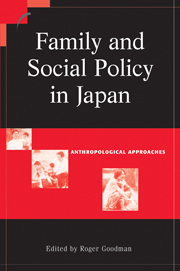Book contents
- Frontmatter
- Contents
- List of Illustrations
- Acknowledgements
- Contributors
- A note to the reader
- 1 Anthropology, policy and the study of Japan
- 2 Toward a cultural biography of civil society in Japan
- 3 Pinning hopes on angels: reflections from an aging Japan's urban landscape
- 4 Reproducing identity: maternal and child healthcare for foreigners in Japan
- 5 State, standardisation and ‘normal’ children: an anthropological study of a preschool
- 6 Child abuse in Japan: ‘discovery’ and the development of policy
- 7 Touching of the hearts: an overview of programmes to promote interaction between the generations in Japan
- 8 Death policies in Japan: the state, the family, and the individual
- 9 Embodiment, citizenship and social policy in contemporary Japan
- Index
5 - State, standardisation and ‘normal’ children: an anthropological study of a preschool
Published online by Cambridge University Press: 05 July 2014
- Frontmatter
- Contents
- List of Illustrations
- Acknowledgements
- Contributors
- A note to the reader
- 1 Anthropology, policy and the study of Japan
- 2 Toward a cultural biography of civil society in Japan
- 3 Pinning hopes on angels: reflections from an aging Japan's urban landscape
- 4 Reproducing identity: maternal and child healthcare for foreigners in Japan
- 5 State, standardisation and ‘normal’ children: an anthropological study of a preschool
- 6 Child abuse in Japan: ‘discovery’ and the development of policy
- 7 Touching of the hearts: an overview of programmes to promote interaction between the generations in Japan
- 8 Death policies in Japan: the state, the family, and the individual
- 9 Embodiment, citizenship and social policy in contemporary Japan
- Index
Summary
In this article, I examine the interrelation between the organisational features of Japanese preschools and the ways by which they are predicated on notions of ‘normal’ (and normalising) development of children. Based on an in-depth study of one such preschool – Katsura Daycare Centre (Hoikuen) in Kyoto – and short visits to a number of other institutions, my article represents an attempt to theorise the organisational character of such preschools. In my earlier work (Ben-Ari 1994; 1995; 1997b) I have suggested that most previous studies of such establishments – kindergartens and daycare centres – tends to see through, rather than look at, the organisational character of such institutions. Consequently, most such studies have tended to focus on the experience of children or on the care proffered them. Thus earlier inquiries such as those carried out by Hendry (1986a; 1986b), Lewis (1989; 1995), Peak (1989; 1991), Tobin (Tobin et al. 1989) – as well as some of my own projects (Ben-Ari 1996; 1997a) – have basically inquired about the kind of socialisation that youngsters undergo in preschools. Here, however, I propose a shift of focus to ask about preschools as institutional structures. This shift allows us to see how patterns of organisation are related to the ways that children are socialised according to a rather uniform set of assumptions and ideas.
- Type
- Chapter
- Information
- Family and Social Policy in JapanAnthropological Approaches, pp. 111 - 130Publisher: Cambridge University PressPrint publication year: 2002
- 2
- Cited by

